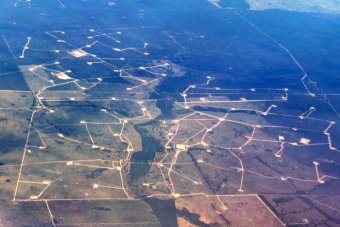Farmers and gas companies have long fought over CSG and fracking but National Farmers Federation wants energy solution
Posted
A row is brewing among farmers over the Federal Government's push to get more gas exploration.
Many farmers have fought CSG development on their land for decades, and in Victoria and the Northern Territory, farm groups have lobbied hard for moratoriums on fracking.
But the peak national lobby group, the National Farmers Federation has other ideas and has called for a national summit on reducing energy costs.
Liverpool Plains farmers want gate locked on gas
"We've spent that many cold nights in our little country hall, debating it and fighting this," said cotton farmer Scott McCalman, on the Liverpool Plains in northern NSW.
"I couldn't count how much time we've put into it, but I know we've spent a lot of cold winters sitting there till midnight," he said.
Mr McCalman said it had been time consuming to fight CSG over the past 15 years, time, he said, he could have spent growing the farm business.
As a leading dryland cotton grower Mr McCalman said he did not want the farmland to become an industrial landscape.
"We farm in one of the few very safe rainfall areas in Australia, with magnificent soil and climate."
He said the group believed 98 per cent of the farmers surveyed in the Liverpool Plains did not want coal seam gas exploration, because of the risks to the groundwater.
It is a concern shared by farmers in Queensland where CSG wells are allowed to have unlimited access to groundwater under section 185 of the Petroleum and Gas Act.
Graham Clapham a cotton and grain farmer on the central Darling Downs, relies on groundwater from the Condamine alluvium.
"We acknowledge the CSG industry is spending a huge amount on understanding the groundwater systems," Mr Clapham told the Queensland Country Hour.
"However if the [CSG] industry continues to take groundwater without regard to the sustainability of that out-take, and uses that water to irrigate pasture, tree crops or other crops, currently not irrigated from groundwater access, that is new take from the groundwater and outside the Great Artesian Management Plan and outside the plan to manage the Condamine Alluvium."
"With an industry like CSG that has to drill through shallow aquifers to get down to the coal seams, they're going through our water that we rely on, you know it's just so critically important," Mr McCalman said.
Farmers here want renewable energy like the solar plants which have been built at Moree in far western NSW.
 Photo:
The Moree Solar Farm, far western NSW which cost $160 million and enough to power 15,000 homes (Supplied)
Photo:
The Moree Solar Farm, far western NSW which cost $160 million and enough to power 15,000 homes (Supplied)
But the National Farmers Federation said gas could work side by side with farmers, if there was more trust that water would not be contaminated or lost.
"The underlying cause of that is the level of uncertainty and level of confidence among regulators and the community, have around gas," Chief Executive Officer of the NFF Tony Mahar, said.
Farmers caught in the middle with high energy bills
"We're really caught in the middle," Mr Mahar said.
"On a global scale we are high cost producers; high energy, labour and transport costs compared to our competitors.
"But when we talk about energy price rises of 200 per cent, that changes the game."
"It affects input costs like fertilisers, that's passed onto the farmer, there's on farm energy use with irrigation, storage and heating, and post farm, manufacturing energy impacts across the supply chain. and ultimately that reduces our competitiveness.
"We export 75 per cent of what we produce, and that will continue."
Patrick Hutchinson of the Meat Industry Council said high energy costs when added to labour and government regulation will force closures in the meat processing industry over the next 6 to 12 months.
"We need to recognise that the processing industry has 35,000 direct employees and 100,000 indirect," Mr Hutchinson said.
"That is 135,000 families that our industry is responsible for."
The call is supported by the National Farmers Federation.
Mr Mahar said with Australian agriculture heading towards a $100 billion industry, there needed to be a national summit to resolve the energy crisis.
"What we want is a coordinated comprehensive approach to the issue of energy security affordability.
"It impacts on the bottom line of Australian farmers.
"The energy market is broken, and we need to have Commonwealth leadership around this and make sure we deliver for the community and for the farming community," Mr Mahar said.
Topics: agricultural-prices, agribusiness, oil-and-gas, solar-energy, electricity-energy-and-utilities, irrigation, sydney-2000, warrnambool-3280, darwin-0800, chinchilla-4413, mullaley-2379









